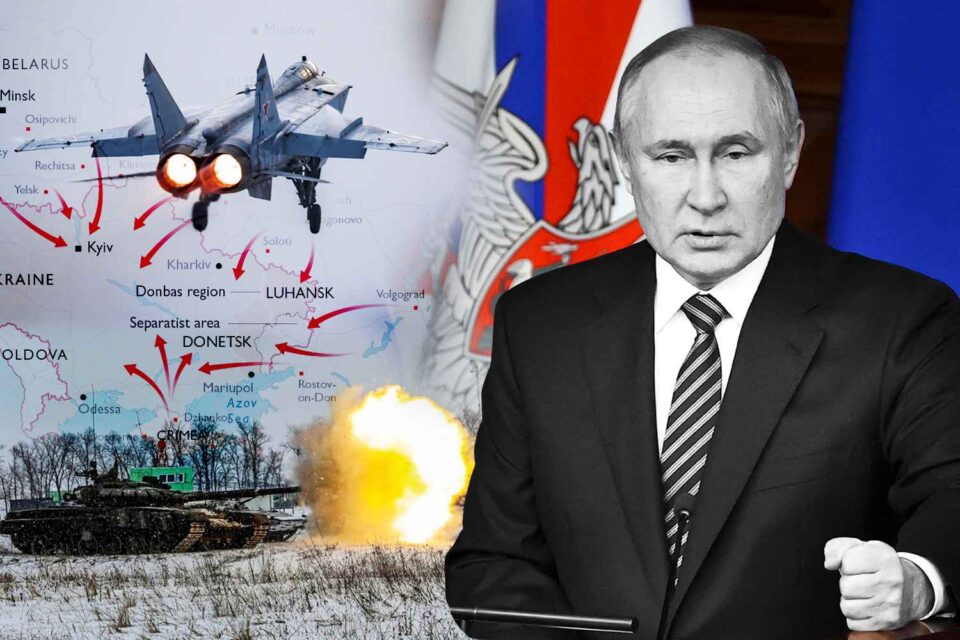By Frank Kamuntu
Who would have thought when Vladimir Putin’s invasion of Ukraine went off the rails two years ago that Russia’s economy would today be growing faster than any in Europe?
Germany has gone from the continent’s powerhouse to a GDP — Gross Domestic Product, or how a nation’s economy is doing — that is smaller than Russia’s by many measurements.
Putin made the classic mistake of bad strategists in assuming that everything would go to plan with the invasion of Ukraine.
But then our leaders in Washington, London and Brussels made their own blunder.
By imposing the toughest-ever economic sanctions on the Kremlin to add to our generous backing for Ukraine, Joe Biden and Co assumed that the Russian economy would tank, Putin would run out of cash to pay for his army, then the Russian people — not least the pampered super-rich oligarchs — would rebel against Putin for plunging them into poverty.
Putin was wildly over-confident about a quick win in February 2022 but the Kremlin had been preparing for Western sanctions for years.
He knew that Washington and its allies would want to punish even successful Russian aggression by blocking oil exports, for instance.
The Kremlin worked out what Washington forgot.
Many countries outside Nato couldn’t give a damn about Ukraine, particularly if Russia offers them a discount on oil.
Pushing Up Wages
Unmarked, even uninsured tankers would soon be shipping black gold to India and other growing consumers of energy.
Germany took a heavy economic hit — and still is — to wean itself off Russian energy imports.
But outside Europe, buyers were queuing up.
Even inside Nato, countries including Britain and the US have still been buying some key raw materials from Russia.
Important exports from the West to Russia have been getting round our official sanctions.
Germany, for instance, exports tech goods as well as cars and parts via the dirt-poor central Asian state of Kyrgyzstan.
If you can’t find it on the map, don’t worry — nor could German exporters two years ago.
Yet Kyrgyzstan’s imports from Germany have gone up a whopping 1,200 per cent since Berlin banned such exports directly to Russia.
Our sanctions have backfired so far.
Russia’s economy has grown faster than any in Western Europe.
Germany’s has shrunk.
Unemployment in Russia has fallen sharply since war broke out.
Of course, mass recruitment into the army partly explains this, but Putin has been massively boosting military industries, sucking in labour and pushing up wages.
With his re-election due next month, Putin can boast that life for average folk is getting better — provided you are not one of his cannon fodder squad dies.
Most Russians are not been directly hit by war casualties so far.
Putin has been clever in conscripting men from remote regions far from Moscow.
The cynical tyrant knows young men in Moscow won’t demonstrate against the war, because if you get arrested you get a one-way ticket to fight in Ukraine.
There is a deep history behind Putin’s ability to survive the West’s sanctions and the Ukrainians’ defiant resistance.
Russia is not a welfare state.
But it has always been a warfare state.
Making war and making weapons of war has been its main industry for hundreds of years.
Stalin did not make Russians rich but he made their country a superpower, at huge human costs.
Like his role model Stalin, Putin mass-produces simple but effective weapons.
Stalin turned out the T34 tank by the thousands, Putin is producing hundreds of thousands of drones.
Cheap but deadly tech.
Today Putin is able to offer a modicum of affluence by employing people to make new weapons — and lots of them.
But if necessary he will tighten belts to keep his own power and Russia’s strength.
Remember, Putin himself comes from Peter the Great’s own city, Saint Petersburg, built to demonstrate that the Russian Empire could match the West.
He grew up in what was then called Leningrad, battered and starved by the Nazis for three years — and it still survived to see Berlin fall to the Red Army in 1945.
Permanent Crisis
Russians believe in a powerful myth — that their wars begin badly but end triumphantly.
That at least is what Putin’s media is drumming into his people’s heads.
In a way, a permanent crisis suits Putin — so long as it is a money-spinner.
So far his busting of sanctions has paid off.
Occasionally Western sanctions manage to take a bite out of Putin’s war chest.
For instance, this week a Chinese bank backed away from a transaction with Russia, fearing the US would sanction it and block its valuable deals in the dollar.
But other Chinese companies do “swaps”, whereby things such as Russian oil magically become non-Russian and the value of that oil pays another Chinese company for selling computer chips or missile technology to Moscow.
But it is not all good news for Putin.
It is not only his regime which has been mobilising to fight back.
So has Ukraine.
The Ukrainians have shown themselves to be quick learners too.
Kyiv has developed its own long-range kamikaze drones which have been striking Putin’s weapons factories and oil industry inside Russia.
Striking at oil terminals on the Baltic coast 600 miles away has probably done more damage to Putin’s money-spinning energy exports than Western sanctions.
The real threat to Ukraine’s chances of survival is the growing weariness in the West to keep paying to support the Ukrainians’ defiance, whereas Kyiv depends on the West to fund its embattled forces while Putin has been strangling its economy.
Sadly, Russia’s militarised economy is now going at full throttle.
Is that despite our sanctions?
No, it is because Putin is getting around them.
Have An Advert Or Article You Want Us To Publish? Whatsapp: +256760530830.


